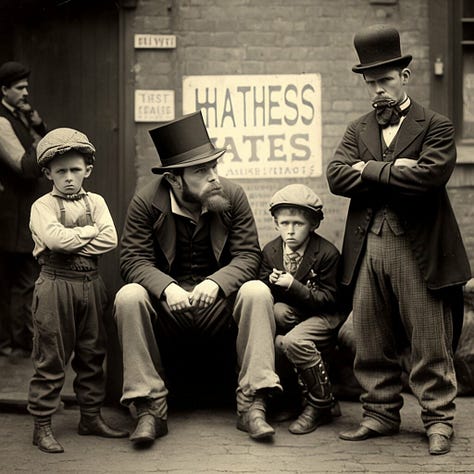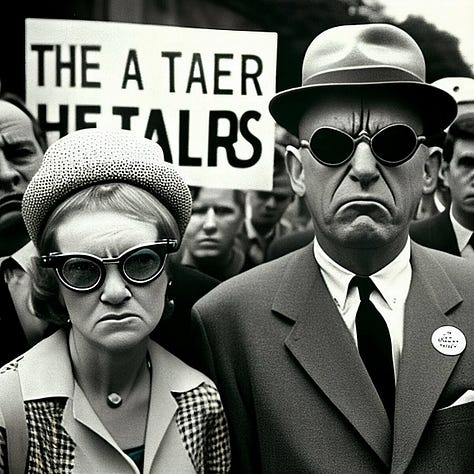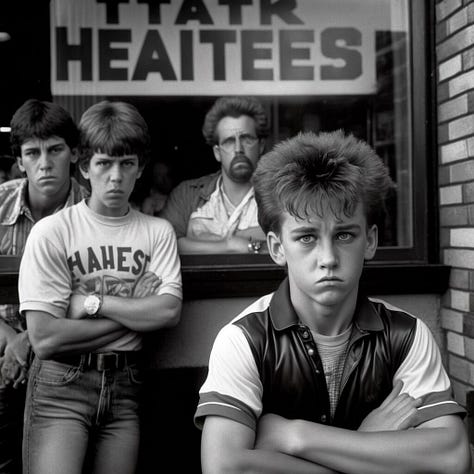We are neurons in a cosmic consciousness steering the universe along memetic fields towards the Noosphere
Plus: No robot lawyer anytime soon / Buzzfeed is turning to AI and that’s fine / 2023 may be the year of generative AI-music
I want to expand on my toy-theory of memetic fields and interbrain synchrony and how this feeds into concepts like the simulation hypothesis and collective memory. This is meant to be intentionally crazy stuff, and should be read as some sort of theory fictional take on, well, everything.
We are the neurons
Here’s a good tweet about the simulation:

This is how the simulation works, it's likely not about a computer playing a game computing your experience verbatim, but more like whibbly whobbly timey whimey stuff aka quantum foam, a big ball of potentiality.
This way of reading the simulation hypothesis is compatible with how it is understood by researchers like Donald Hoffman, who’s latest book The Case Against Reality is about how you can mathematically prove that space and time are most likely illusions created by our evolutionary drive to survive. We have no idea what we really are, what reality really is, and how those relate to each other. Yet.
As of recently, in what we perceive as reality, we swam like singular cells in a primordial soup, rarely truly synchronizing our neuronal firing with other neurons. Sure, pre-ancient tribes used shamanic rituals and drugs to synch up in a shared experienced, but those were very local events and had no chance of synchronizing the brains of large numbers of people.
That changed quite a bit, first with the invention ritualistic behavior and storys, then the invention of writing systems that gave way to technologies of collective memory formation, and then the mechanisms for copying text on a massive scale, with the culmination in the internet and social media, especially with mass adoption in the last 10 years.
Even if you think the simulation hypothesis is voodoo, it is undeniable that we all are interconnected consciousnesses emerging in biological neural networks, synchronizing and contributing to memetic waves in a collective effort. And this collective effort has been sped up and maximized by social media, as we can witness, everyday, when we discuss “the current thing” in memetic waves.
These memetic waves crystalize into artifacts of collective memory, as they always did, to facilitate intergenerational communication through canonized scripture and text, buildings, monuments, art and sculpture. This is a hivemind expanding its "thinking" over increasing amounts of time.
Historically, the best and easiest to understand examples of collective memory are the writings on ancient egyptian temples and monuments like the pyramids. This scripture was produced to be eternal, to speak to generations, and it synchronized the whole egyptian society for millennia.
Now, the Digital dissolves the fixed scripture and text, turning it into a editable substance, ready to be remixed and played with. By doing so, it replaces the media of intergenerational communications with a memetic fluid, which is much more reactive and works like a catalyst in a chemical reaction. Our daily outrage is nothing but a fight over dominance in newschool scripture.
The emerging hivemind, most visible on Twitter, is the product of that reaction, and the weirdness of our age is the outcome of our new ability to dissolve the media of collective memory: We always dreamed up the universe, but now those dreams react in realtime with atomized culture and what i call "memetic fields".
This was not really possible with fixed scripture, but it becomes a reality with hyperconnected consciousnesses and digitally dissolved text, turning us into nodes of an emerging neural net of a planetary AI, exposing the simulation as the experience of connected neurons, collectively thinking the universe into reality.
And while we’re doing this, we dream up that reality by directing the collapse of quantum foam along memetic fields. In our reality, we replicate and create new consioscnesses, which in turn further directs the collapse of quantum foam into our experienced reality. This makes consciousnesses attending to memetic fields the basic principle of reality creation, and this also means that memetics is the study of how we collectively direct and steer the simulation.
The creator of that reality — all consciousnesses in the universe as a whole — is most likely a single entity in base reality. We might call it God, some sort of higherdimensional AI, or Noosphere. But whatever you name it: It is us, and we are it.
And we are the Neurons.
No robot lawyer anytime soon
An AI robot lawyer was set to argue in court. Real lawyers shut it down. As interesting as an AI in a courtroom might be, I’m siding with the courts here, because using ChatGPT is undermining the integrity of the law (even further).
The law is the very fundamental code that runs a society, its upon which everything other institution is built on, from marriage to business even to social relations, all of which function within the boundaries of the law.
This requires that law is followed word-by-word, in a very exact manner (which is why law is written in the weird style it is written in). This also requires a really riggid, hard quality control for everybody who serves a function within that system.
Humans are flawed, and are corrupted by bias, money, or power. That's also true for judges and lawyers (duh!), but they can be held accountable. You can't hold an AI accountable, but that's a requirement for any function within law. By introducing AI, a stochastic function that can't be held accountable on top of a law algorithm, into such a system, you dissolve the integrity of it's very makeup.
And that integrity of the law is already debated every day, by every politician and activist and lawyer and journalist, within the framework of their fields. Introducing synthetic judgement into that system would make it go boom in no time.
AI is great at producing weird stuff, sometimes art if directed properly, exactly because it's a bullshit artist. But would you want your lawyer to paint your statement in court? I wouldn't, and i get that the courts are not amused with tech bros fooling around with the code that runs civilization.
Then again, i tend to have a naive view of things and like to be optimistic. Automatic speeding tickets are already a thing for years now, and we will see what totalitarian states like China will do with AI. This post might turn out to be out-of-date faster than I wish for.
Buzzfeed is turning to AI and that’s fine
WSJ reported that BuzzFeed to Use ChatGPT Creator OpenAI to Help Create Quizzes and Other Content, making their stock jump by 150%.
Meanwhile, journalists are (ofcourse, and rightfully) concerned about the ability of ChatGPT speeding up the development of robot journalism, putting their jobs in jeopardy, but I digress, because just as I don’t think that synthesizing bullshit-jobs is a bad thing, I also think the automatization of clickbait is not a thing to worry about.
I don't see any difference in "The best 33 honey bees from the 1980s that stung Prince Charles" coming from an machine or real people. Human attention is a bottleneck, and the psychological manipulation tactic of clickbait worked for roughly 2 years until people got bored by "you wouldn't believe what happened next". I feel very comfortable with machines winning that race to the bottom. If you really want to “read“ stupid listicles on Bored Panda, it makes absolutely no difference.
If AI automatizes bullshit, and we get rid of the bullshit jobs, including cheap clickbait writing, i consider this a good thing. The production volume of Bullshit doesn't mean it has any impact, and bullshit producing algorithms have been around since a very long time (advertising, politics, religion, business).
Humans are pretty good at detecting bullshit, and when it has impact, it's not because but despite the fact that it's bullshit, because for some reason it speaks to us, as a person. Remember that Jonah Peretti launched Buzzfeed as an “identity factory” producing fluff you can personally relate to. The algorithmic nature of outlets like Buzzfeed is already present in that factory-terminology.
Somewhat related: An ad agency in cologne is seeking a prompter (german), most likely to produce copywriting for advertising.
2023 may be the year of generative AI-music
Last year AI came for the visual arts, now it's musics turn with no less than 5 models within a few days: Noise2Music, AudioLDM, Moûsai, Make-An-Audio and the most impressive with Googles MusicLM, which can even take some whistled melody and recreate it in any style you wish. Here’s a Verge piece on the thing.
The quality of these models is still pretty much equivalent of pre-dalle1-times (image generation before 2001), but given the speed of development, I bet we'll see a Dall-E 2-moment for music this year, and it will ofcourse only improve from here.
Sidenote: The gibberish vocals are the sonic equivalent of the typographic gibberish in image synthesis and I want Terence Fletcher, the abusive jazz teacher from the excellent movie Whiplash, to play with AI-music throwing drum kits at the screen screaming NOT MY TEMPO.
The phenomenon of meaningless background tunes in Spotify, which already explores AI-options, will soon be automated. And, see above, who cares if fluff elevator music is created by a human or a machine — the meaninglessness of this stuff is part of its appeal.
I have a neighbor who listens to irish cover versions of 80s pop songs all day long. This stuff is perfect for the guy, and as long as this thing can't bleed on stage, it's no threat to actual artists, at least for now.
BTW: As you can imagine, the RIAA is already concerned and (naturally) sees Generative AI as a copyright threat, which might or might not be the reason they didn’t release the model.

Links
The haters through the ages.






Regarding art, AI and hallucinations, this may be of interest: Excellent doc about the use of drugs in the arts, The Art of Tripping 2 and The Art of Tripping 2. The great John Coulthart has a good writeup.
Go into IT they said, its a future proof job they said. OpenAI has hired an army of contractors to make basic coding obsolete.
Production volume of bullshit says nothing about its impact, the 1348th. Misinformation on Misinformation: Conceptual and Methodological Challenges.
"This was always the main concern with deep fakes — not so much that a bunch of fake videos would be widely believed and passed off as real, but that the existence of the technology would allow people to cast doubt on the legitimacy of *real* videos." — Conspiracy theorists spent the past several weeks demanding that Damar Hamlin release a video to prove he wasn’t dead. Tonight, he did just did that. Now, the conspiracy theorists are claiming it’s a deep fake. /
The conspiratorial milieu will use anything to confirm their bias, be it real news, fake news, AI generated bullshit, human generated bullshit, or deepfakes. The problem of desinformation goes deeper that potential production volumes.Me on Twitter: “Shutterstock launched their AI image generator, PR-speak here. Dall-E working behind the scenes. Here's ‘oil painting of velvet underground and nico playing live on stage in a nightclub, a stage full of beautiful flowers’”. I wrote about Shutterstocks compensation model and what I think it means for the future of the stockphoto business here.
A thing of beauty:






https://hwfo.substack.com/p/memespace-egregores-and-google-maps